
Anyone have $500?
PF Episodes
Directed by Bob Claver:
Episode #6
"Love At First Slight"
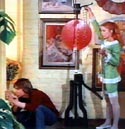
To escape the onslaught of sceaming girls, Keith runs into a dress shop, and falls for a girl - who has no interest in him.
Episode #46
"Promise Her Anything, But Give Her A Punch"
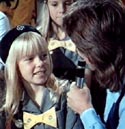
It's Danny vs. Keith - when Gloria Hickey develops a crush on the wrong Partridge.
Episode #54
"A Penny For His Thoughts"
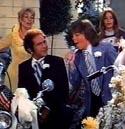
Shirley gives lessons in love to a biker named Snake, who was dejected by his girlfriend.
Episode #63
"Aspirin At 7, Dinner At 8"
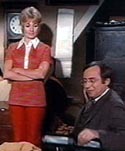
Pediatrician Bernie Applebaum falls for Shirley.
Episode #66
"I Left My Heart In Cincinnati"

While performing at an amusement park, Keith and Danny both fall for an older woman.
Episode #69
"Everything You Wanted To Know About Sex... But Couldn't Pronounce"

America's heartthrob is failing sex education
Episode #96
"S.O.S."
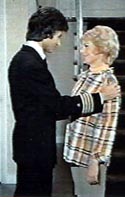
An old flame of Shirley's sails into town, and Keith and Danny are concerned he has a woman in every port.

Continued...
GH: Where was the musical number from the pilot filmed?
BC: It was supposed to be a Las Vegas showroom, but it was filmed at the Palladium in Los Angeles.
GH: We get a lot of inquiries about the bus. What can you tell us about it?
BC: It wasn’t painted like Bernie imagined – which was much more psychedelic in design. The network was afraid of the connotation to drugs, so they went with a safer design, inspired by the artist, Mondrian. It was a clunker, too! I think we paid $500.00 for it, and it kept breaking down. It was pushed into a scene more times than driven! It was hard to drive and steer, too! The shots of them driving along the coast was filmed in Malibu. We took it out for a day, and did all sorts of run-bys to get stock footage.
GH: There were several performing costumes, and set changes during the run. Any particular reason why?
BC: It was just to keep it fresh. Costumes would be changed, just like everyday in real life. The sets were freshened up for each new season. It was a pretty dull set, actually. But that’s what the show called for – a generic, suburban living room.
GH: What is the “true Hollywood story” behind the departure of Jeremy Gelbwaks? Was he a terror on the set (throwing things at the directors) or did his father really get transferred?
BC: I have heard those stories too. There were a lot of problems, but if I had seen that, he really would have been in trouble. Frankly, I thought his mother was more trouble than he was. But here is how it happened: Their family was moving – I believe back east. Their lawyer called me up. At this point, ABC had not yet renewed the show for a second season – although I new it was going to be. You see, the show really got big in it’s first summer reruns (1971). The lawyer said the Gelbwaks family was trying to make a decision about Jeremy, and asked if the show was going to be renewed. I said, “I don’t know” – which was technically true. His feeling was that it wasn’t going to go anywhere, so I agreed. It was a little white lie, and off they went. Truthfully, I don’t think I received any more than 2 letters about it.
GH: How much interference did you have from ABC on a weekly basis?
BC: They weren’t too bad. I subsequently did other shows, where the networks were just awful. I would have screaming matches with them. But not this one.
GH: How long does it take to complete a half-hour show?
BC: Today, with the multiple camera shows you can get a show on the air in 10 days, from the time the script is written. You can’t do that with one-camera shows, like The Partridge Family. You have to have lead time, and be prepared if someone gets sick. It great if you can be 8 to 10 shows ahead of airdate.
GH: How did the Bahlers get involved with the show?
BC: They were there in the beginning with Ron Hicklin. But Wes Farrell came in and became the music producer.
GH: Who is responsible for hiring him?
BC: I went looking for advice. I certainly didn’t come heavily equipped with knowledge of bubblegum music. We needed a musical number per episode and obviously needed someone to do it. Actually, Bell Records was the recording company. Columbia owned Bell Records. So they owned the Recording Company, the Publishing Company, and the TV show – not bad! They made a lot of money on the show! I think they agreed to hire Wes because he had a track record as a producer of good music. I certainly couldn’t do it – I knew nothing about bubblegum music.
GH: Who chose the songs for the episodes?
BC: Wes would give me a bunch of songs and then we would choose. Most of the time it didn’t matter. Once in a while we would need a song that leaned a certain way, and I would ask him for it and he would come up with something. I think Wes did a great job. He had great writers, too.
GH: Did you attend any recording sessions?
BC: I might have gone to half a dozen recording sessions here and there, but I was totally trusting. After all, I was in complete charge of the production. If I didn’t like it, I didn’t have to use it. So it was silly to sit there. But I never rejected one song he gave me. Paul [Junger Witt] occasionally went as well.
GH: Did David come to you and ask to sing or Wes?
BC: Yes, he came to me and asked to sing. To me, it was always a great idea. I wasn’t against it at all. You had so much more of a chance for the music to mean something. We released “I Think I Love You”, and that song caught on even before we went on the air! It was free publicity for the show, and Bell Records made a lot of money.
GH: How much interference did the record producers have from the network?
BC: That would be something where there would be no reason for me to get involved in. My responsibility was to the show itself. As far as anything other than that which pertained to The Partridge Family, that would have been handled by Jackie [Cooper, head of Screen Gems]. However, I know ABC had no control over the creative content of the record.
GH: It’s been reported there was a problem with the first album’s original cover. The network felt that a photo of the cast in costume, in front of the bus, was property of ABC. In a way, their photo was selling the album, and residuals would have been due to ABC. So the cover was changed at the last minute, and the photo was used as an insert.
BC: Well, I can definitely believe that – as incredible as it sounds. The single, however, became a smash before the show even hit the air. So their photo on the cover didn’t do any good as far as sales were concerned. It’s like this: Some guy sits in an office and tries to make a score. He’ll think up some stupid idea and cause a lot of people trouble, and some dummy will go along with it. It’s usually some novice who doesn’t know anything about Hollywood.
GH: Is that typical of Hollywood?
BC: I don’t know how typical it is today. But you could count the number of great executives on one hand! You’ve got the Grant Tinkers, etc.
GH: That’s because they hire people they have confidence in, and let them do the job they were hired to do!
BC: You said it! I was directing an episode
of Rhoda, or Newhart – I forget which. Grant Tinker came to a run through,
and it was a really bad show. He called me over and said, “I assume you
know what to do with this. That’s why you were hired.” And then he left.
In other words: “Fix it, or I’ll get somebody else to do it.” Now that
put the pressure on me, but that’s what was supposed to happen. That’s
fair. He didn’t know how to fix those things and didn’t pretend to. He
paid people well, and treated people well.